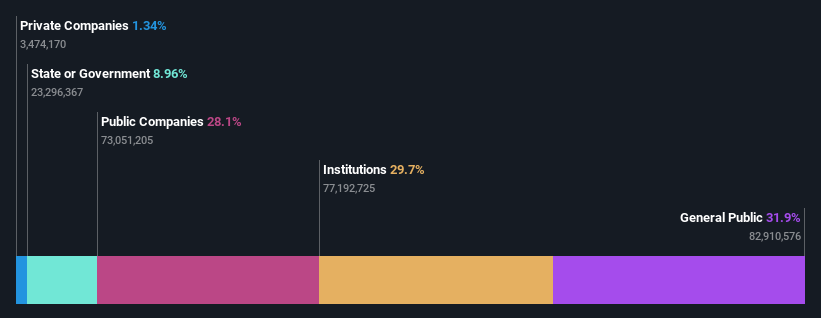- India
- /
- Diversified Financial
- /
- NSEI:PNBHOUSING
Retail investors who hold 32% of PNB Housing Finance Limited (NSE:PNBHOUSING) gained 5.1%, institutions profited as well

Key Insights
- The considerable ownership by retail investors in PNB Housing Finance indicates that they collectively have a greater say in management and business strategy
- The top 9 shareholders own 50% of the company
- Institutions own 30% of PNB Housing Finance
Every investor in PNB Housing Finance Limited (NSE:PNBHOUSING) should be aware of the most powerful shareholder groups. The group holding the most number of shares in the company, around 32% to be precise, is retail investors. Put another way, the group faces the maximum upside potential (or downside risk).
While retail investors were the group that reaped the most benefits after last week’s 5.1% price gain, institutions also received a 30% cut.
Let's take a closer look to see what the different types of shareholders can tell us about PNB Housing Finance.
View our latest analysis for PNB Housing Finance

What Does The Institutional Ownership Tell Us About PNB Housing Finance?
Institutions typically measure themselves against a benchmark when reporting to their own investors, so they often become more enthusiastic about a stock once it's included in a major index. We would expect most companies to have some institutions on the register, especially if they are growing.
As you can see, institutional investors have a fair amount of stake in PNB Housing Finance. This suggests some credibility amongst professional investors. But we can't rely on that fact alone since institutions make bad investments sometimes, just like everyone does. If multiple institutions change their view on a stock at the same time, you could see the share price drop fast. It's therefore worth looking at PNB Housing Finance's earnings history below. Of course, the future is what really matters.

PNB Housing Finance is not owned by hedge funds. Looking at our data, we can see that the largest shareholder is Punjab National Bank with 28% of shares outstanding. Singapore is the second largest shareholder owning 7.5% of common stock, and HSBC Global Asset Management (UK) Limited holds about 2.5% of the company stock.
On further inspection, we found that more than half the company's shares are owned by the top 9 shareholders, suggesting that the interests of the larger shareholders are balanced out to an extent by the smaller ones.
While it makes sense to study institutional ownership data for a company, it also makes sense to study analyst sentiments to know which way the wind is blowing. There are a reasonable number of analysts covering the stock, so it might be useful to find out their aggregate view on the future.
Insider Ownership Of PNB Housing Finance
The definition of company insiders can be subjective and does vary between jurisdictions. Our data reflects individual insiders, capturing board members at the very least. Company management run the business, but the CEO will answer to the board, even if he or she is a member of it.
Most consider insider ownership a positive because it can indicate the board is well aligned with other shareholders. However, on some occasions too much power is concentrated within this group.
We note our data does not show any board members holding shares, personally. It is unusual not to have at least some personal holdings by board members, so our data might be flawed. A good next step would be to check how much the CEO is paid.
General Public Ownership
The general public, who are usually individual investors, hold a 32% stake in PNB Housing Finance. While this group can't necessarily call the shots, it can certainly have a real influence on how the company is run.
Public Company Ownership
It appears to us that public companies own 28% of PNB Housing Finance. This may be a strategic interest and the two companies may have related business interests. It could be that they have de-merged. This holding is probably worth investigating further.
Next Steps:
I find it very interesting to look at who exactly owns a company. But to truly gain insight, we need to consider other information, too. Case in point: We've spotted 2 warning signs for PNB Housing Finance you should be aware of, and 1 of them can't be ignored.
If you would prefer discover what analysts are predicting in terms of future growth, do not miss this free report on analyst forecasts.
NB: Figures in this article are calculated using data from the last twelve months, which refer to the 12-month period ending on the last date of the month the financial statement is dated. This may not be consistent with full year annual report figures.
New: Manage All Your Stock Portfolios in One Place
We've created the ultimate portfolio companion for stock investors, and it's free.
• Connect an unlimited number of Portfolios and see your total in one currency
• Be alerted to new Warning Signs or Risks via email or mobile
• Track the Fair Value of your stocks
Have feedback on this article? Concerned about the content? Get in touch with us directly. Alternatively, email editorial-team (at) simplywallst.com.
This article by Simply Wall St is general in nature. We provide commentary based on historical data and analyst forecasts only using an unbiased methodology and our articles are not intended to be financial advice. It does not constitute a recommendation to buy or sell any stock, and does not take account of your objectives, or your financial situation. We aim to bring you long-term focused analysis driven by fundamental data. Note that our analysis may not factor in the latest price-sensitive company announcements or qualitative material. Simply Wall St has no position in any stocks mentioned.
About NSEI:PNBHOUSING
Solid track record and fair value.
Similar Companies
Market Insights
Community Narratives




